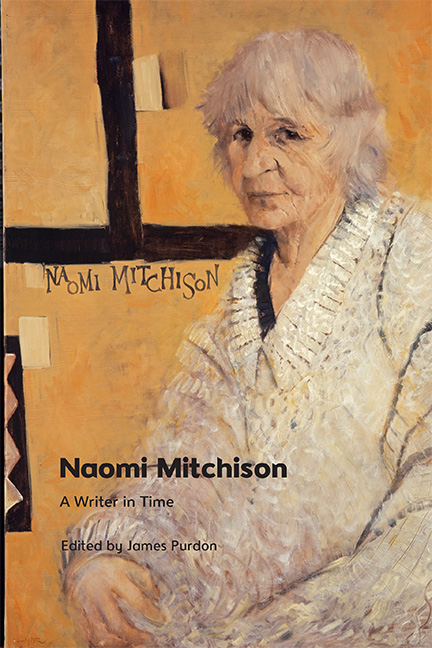Book contents
- Frontmatter
- Contents
- Acknowledgements
- Notes on Contributors
- Introduction
- 1 Naomi Mitchison’s Interwar Short Stories
- 2 ‘She had her hand on the plow’: Shame, Uncertainty and Transformation in The Corn King and the Spring Queen
- 3 Varieties of Sexual Experience: Naomi Mitchison, Mysticism and Gerald Heard
- 4 Scientific Temporalities in We Have Been Warned and ‘Beyond This Limit’
- 5 Send in the Clones? Naomi Mitchison and the Politics of Reproduction and Motherhood
- 6 From Argyll with Love: Naomi Mitchison and the Soviet Union
- 7 Fire or Blood? Aestheticising Resistance in Naomi Mitchison’s The Blood of the Martyrs
- 8 ‘The summoning urgent thing’: The Bull Calves and the Drive to Experiment at Mid-Century
- 9 Mitchison, Decolonisation and African Modernity
- Naomi Mitchison’s ‘Europe’
- Europe
- Bibliography
- Index
Introduction
Published online by Cambridge University Press: 18 November 2023
- Frontmatter
- Contents
- Acknowledgements
- Notes on Contributors
- Introduction
- 1 Naomi Mitchison’s Interwar Short Stories
- 2 ‘She had her hand on the plow’: Shame, Uncertainty and Transformation in The Corn King and the Spring Queen
- 3 Varieties of Sexual Experience: Naomi Mitchison, Mysticism and Gerald Heard
- 4 Scientific Temporalities in We Have Been Warned and ‘Beyond This Limit’
- 5 Send in the Clones? Naomi Mitchison and the Politics of Reproduction and Motherhood
- 6 From Argyll with Love: Naomi Mitchison and the Soviet Union
- 7 Fire or Blood? Aestheticising Resistance in Naomi Mitchison’s The Blood of the Martyrs
- 8 ‘The summoning urgent thing’: The Bull Calves and the Drive to Experiment at Mid-Century
- 9 Mitchison, Decolonisation and African Modernity
- Naomi Mitchison’s ‘Europe’
- Europe
- Bibliography
- Index
Summary
Sometimes I think of my life in terms of time: my own time and the very different times of other people.
Naomi Mitchison, Memoirs of a Spacewoman (1962)Naomi Mary Margaret Haldane – later Naomi Mitchison – was born on Monday, 1 November 1897, in an elegant Edinburgh townhouse overlooking the Water of Leith. Her parents belonged to the prosperous elite of Scottish society, and the milieu in which she grew up was in many ways that of the traditional, upper-class Victorian establishment. Her mother, Louisa Kathleen (née Trotter), could trace her ancestry back to Henry Dundas, First Lord of the Admiralty under Pitt the Younger, while her father, the physiologist John Scott Haldane, belonged to one of Scotland’s most eminent families, the Haldanes of Gleneagles. There were nursemaids and servants, family worship on Sundays, and a public-service ethic of noblesse oblige. There were big, draughty houses in Edinburgh and Perthshire, as well as in Oxford, where J. S. Haldane was a fellow of New College, and where, aside from frequent Scottish holidays, Naomi would spend most of her childhood. Yet the Haldanes were also a family of progressive intellectuals: scientists, jurists, writers and free-thinkers with remarkably wide-ranging interests. Naomi’s uncle, the barrister and statesman Richard Haldane, was an unseasonable admirer of Goethe and Schopenhauer, an important reformer of the British Army, and eventually Lord Chancellor in Ramsay Macdonald’s first Labour government. Another uncle, William, was Crown Agent for Scotland (the most senior prosecutorial role in the Scottish justice system), while her aunt Elizabeth – a skilled administrator who helped to establish the Voluntary Aid Detachment – wrote studies of Descartes and George Eliot, and later became Scotland’s first woman Justice of the Peace.
Tradition and modernity; custom and curiosity; religious observance and scientific rationalism; success within the venerable institutions of British society coupled with an open, internationalist outlook: this combination of influences would feed Naomi Mitchison’s imagination and shape a writing life that extended across most of the twentieth century. From her early childhood she acquired a strong sense of the reality of the past, and of writing as a way of bringing past, present and future together.
- Type
- Chapter
- Information
- Naomi MitchisonA Writer in Time, pp. 1 - 14Publisher: Edinburgh University PressPrint publication year: 2023



